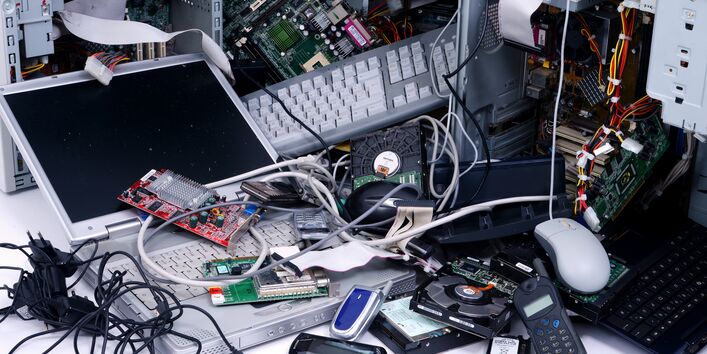WEEE: EU-wide enforcement of producer responsibility
The agencies from nearly 20 EU countries responsible for the enforcement of the European WEEE Directive have formed a network. UBA initiated the constitutional meeting on 7-8 September 2017. The representatives from all participating EU-countries agreed to cooperate more closely in the future in order to prosecute non-compliant producers who trade across borders more effectively.
Producers wanting to place electrical and electronic equipment (EEE) on the market in Germany are first required to register with stiftung elektro-altgeräte register (ear) since they will later be responsible for the proper disposal of their products. Along with this requirement, which is valid in all EU Member States, the European legislator updated the Directive on waste electrical and electronic equipment (WEEE Directive 2012/19/EU) in 2012 to include a new requirement for producers who are not established on the market of the respective Member State: the appointment of an authorised representative in the country where they sell EEE without being established. The purpose of having this new legal entity (authorised representative) is to ensure that every national register has a domestic contact for a producer established in another country.
Article 17 WEEE Directive 2012/19/EU requires the Member States to ensure that producers from other Member States can appoint an authorised representative. Member States must further ensure that producers which are established in their own countries have appointed an authorised representative in any other Member States before they place EEE on the market there.
Germany transposed Article 17 of the WEEE Directive 2012/19/EU into German law on 20 October 2015 in Section 8 of the Electrical and Electronic Equipment Act (ElektroG). Section 8 ElektroG regulates the appointment of authorised representatives in Germany for foreign producers and the appointment of authorised representatives for German producers in another Member State of the European Economic Area.
The procedure in Germany involves a written commissioning of the authorised representative (in German language) and acceptance of the representative by the responsible authority stiftung ear. The authorised representative may be a natural person or a legal entity which must be established in Germany.
The authorised representative assumes all responsibilities of the foreign-based producer, in particular the registration of that producer's marketed EEE, indicating brand, category and type of device. The duties of the authorised representative also include quantity reports. Non-compliance by the authorised representative may result in regulatory offence procedures.
Foreign-based producers will be sanctioned if they place EEE on the market in Germany and have failed to appoint an authorised representative beforehand. To prosecute these violations more effectively, the enforcement authorities responsible have formed the European WEEE Enforcement Network (EWEN). The network will reduce translation and notification problems in the future because only the sanctioning authority of the country in which the producer is established will be responsible for tracking activities.
The participants of the first EWEN meeting hope that closer cooperation will result in a higher rate of registration of authorised representatives and thus lead to a fairer competition between domestic and foreign producers of electrical and electronic equipment.
